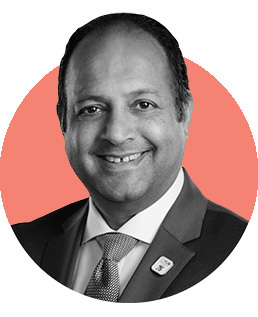Y WE TRAVEL
Why do we travel? For too long, we took this question for granted. Travel can make our large world small, and we forgot what a gift this is until it all got taken away from us not too long ago. Today, we’re returning to the skies in record numbers, but with a more appreciative mindset. It’s a perfect moment to take stock. The contributors to the “Y WE TRAVEL” series are accomplished writers from all walks of life. Over the length of this series, they will explore the diversity of purpose in our journeys—not just where or how, but why. On behalf of Toronto Pearson Airport and the Canadian Airports Council, please enjoy.
Itravel to taste the unknown: chasing flavours around the globe, always seeking new dishes, new ingredients, new experiences. Travel is an adventure that unfolds one bite at a time. Recently, I went foraging outside Asheville, North Carolina, for wild Blue Ridge truffles, which had a beguiling sex-funk aroma and delivered an earthy rush when I enjoyed generous slivers on a melted havarti and ham sandwich. A couple summers back in South Hero, Vermont, I consumed a Brain Freeze—a cup of ice-cold apple cider slush hiding a pirouette of maple creemee, essentially syrup-sweetened soft serve. It played in my mouth like the Green Mountain State’s version of a creamsicle. And then there was last year’s giant bowl of bright red Singaporean chili crab: slightly sweet, sea-kissed, and super savoury. I gobbled it up with puffy fried mantou buns, a happy mess requiring both gloves and a bib.
Each of these dishes were visceral embodiments of the place I was visiting: part terroir, part culture, part experience, now indelibly intertwined with my memory and comprehension of it. But to begin to understand another country’s culinary traditions, I don’t start in restaurants, I spend time in its grocery stores. Wandering the aisles, I keep my head on a swivel, picking up this, smelling that, reading the label on something else.
“I don’t want to follow the guidebooks, apps, and best-of lists. I want to unearth where locals eat so I can taste what they taste…”
Since bringing produce and other fresh foods across borders is prohibited, I opt on these trips for a mix of condiments, pantry items, and snacks. A recent shopping excursion in Winnipeg yielded honey-dill dipping sauce, Manitoba-grown wild rice, and a few bags of locally made Old Dutch potato chips. These purchases weren’t just about eating, they were about educating. I learned about Winnipeggers’ deep love of chicken fingers, the connection between wild grain and Ojibwe people, and the backstory of one of the city’s most enduring food companies.
Where We Travel

“I have a dirty secret: where I travel often is to Toronto. I love going there, and it’s not just because of the food and the tourist attractions. It’s because I spent a few years in the Greater Toronto area as a child and as a university student. It was a formative time in my life, which I reminisce about every time I’m in town. Many of my people are still there—friends and family members I can’t wait to catch up with, all in one place. It’s also because I do business there. Toronto is the country’s economic hub. I get invigorated by the hustle and bustle, and I appreciate its role in our national economy. And finally, it’s because I can’t do my job without it. Kelowna (YLW) has multiple daily flights to and from Toronto Pearson (YYZ), which is one of North America’s best-connected airports for international flights. These flights are critical for Okanagan tourism, bringing hundreds of thousands of people here each year to enjoy our sunny climate, rich First Nations culture and world-class skiing, vineyards, and cuisine. And they’re also vital for my work travel to Europe and the Atlantic seaboard. So yes, I love going to Toronto. For me, it’s indispensable.”
– Sam SamaddarCEO, Kelowna International Airport
When I’m unsure what something is, what it might taste like or how to cook it, I’ll ask an employee or fellow customer. I’m always quizzing people about food when I travel. Anyone working an early shift gets their brain picked about the best coffee around. I’ll ask my Uber driver where she goes for her lunch break. If someone has a loaf protruding from their bag or is devouring a tasty looking pastry, I stop to get the lowdown on where they got it. Any chef I encounter, I’ll inquire where they ate their last great meal. Concierges, clerks, whomever I’m sitting next to on the plane or the bus, they all get interrogated on what and where to eat. And if I ever see a line at a street food cart or market stall, I’ll find out why the wait is worth it. In all these interactions, there’s the bonus of immediately creating common ground between strangers. With food as a touchstone between us, I can talk to anyone, anywhere. Barriers disappear, preconceptions evaporate. Suddenly, we’re just fellow humans talking about what we love to eat.
After all, I don’t want to follow the guidebooks, apps, and best-of lists. I want to unearth where locals eat so I can taste what they taste since these are some of the truest flavours of a place.
Better still, I want to join someone to eat in their home. It doesn’t have to be anything fancy. In fact, I’d prefer if it was utterly routine. Daily life is sometimes scoffed at for being too, well, quotidian, not worthy of deeper examination. But everyday meals offer the most intimate peek into people’s foundational food rituals. When you get to experience these simple routines, you begin to understand their fundamentals, what matters most to them. When looking at life, most people just remember the highs and lows, but it’s the middle ground where most living is done.
To taste the unknown, you also must be fearless. No matter your assumptions, how something looks or smells, where it came from or who prepared it, you must surrender to the experience of discovery. Admittedly, results can vary. At the less pleasant end of my spectrum was raw piure, a sea-squirt found in the coastal waters off Chile. It’s a slimy, metallic-tasting creature that’s supposed to be an aphrodisiac, but it definitely didn’t turn me on. Contrast that with Tokyo’s Pizza Savoy, topped with melt-in-your-mouth raw ahi tuna and freshly grated wasabi that was more sweet than spicy, the most extraordinary pizza I’ve ever eaten—and I’ve downed thousands.
As we beat new patterns into our taste buds, we’re embarking on a journey of self-discovery, a continual refinement of likes and dislikes. As our palates change, so does our taste. Exposure to a wider and more diverse set of flavour combinations awakens new pleasures while helping dispose of old stereotype—like my childish belief that Mexican cuisine was a monolith until I began crisscrossing the country and realized it is a riotous mosaic of traditions and tastes that vary widely by region. I believe in trying most things repeatedly—piure notwithstanding—because maybe I just haven’t had the right one or the best preparation, or maybe I’ve evolved.
There is some gastronomical sleight-of-hand at work here. Every supposedly new taste is, in fact, familiar, a kind of homecoming. Every flavour you will ever experience is already hidden inside you, waiting to be discovered. When something new hits your palate, it plays on your tastebuds in a fresh combination of salty-sweet- sour-bitter-umami, maybe reminiscent of something you’ve tried before, perhaps utterly unlike anything you’ve had the privilege to taste.
Each time I board a plane, I wonder what I will unlock inside myself, what I will learn, what boundaries I will push, and what flavours, new or old, await.
Nevin Martell is a Washington, DC-area based food and travel writer, whose work regularly appears in the Washington Post, the Boston Globe, and USA Today. He is the author of eight books. Find him online nevinmartell.com and on Instagram @nevinmartell.
Explore the rest of the Y WE TRAVEL series.




